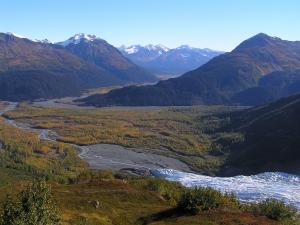
Homer, Alaska (May 31, 2004) Ð The guided missile cruiser USS Lake Champlain (CG 57) sits at the end of Homer Spit 4.5 miles into Kachemak bay in Homer, Alaska. Lake Champlain is in the Gulf of Alaska participating in the annual Northern Edge exercise as part of the USS John C. Stennis (CVN 74) Carrier Strike Group (CSG). U.S. Navy photo by Journalist 1st Class Andrea J. Leahy (RELEASED)
Julia Rosen is a science reporter for the Los Angeles Times, with a PhD in Geology; she is based in Portland, OR. She wrote an important piece on Friday, July 12, 2019 concerning the vexed question of why so few persons actually discuss the issue of climate change, either with their friends or their families. The article is titled: “Why has climate change become a taboo subject?” with the subtitle: “Here are ways to end the silence and effect a shift in perceptions.” As one who has written often, and I hope passionately, about this increasingly important subject, I was fascinated by this brief article, and want to share some of its findings with you, my religious readers. We simply must find ways to get this crucial question into the mainstream of American life; no more delay is possible since the rising temperatures and cresting seas and the melting icecaps and glaciers, along with the increasing intensity of storms and fires, give us no more time to be arguing about whether global warming is happening. It is happening, and fully 97% of reputable scientists agree, an unprecedented level of agreement in the world of science.
I know full well that we are receiving no help from the ostriches who currently occupy Washington’s seats of power. Sticking their heads in the sand, observing a booming stock market (truly the DOW must now post its results underground to enable these fools to see!), and a suspiciously low rate of unemployment (how many of these workers must hold three jobs to survive?), Trump and his sycophantic minions continue to deny the realities of what any 4th grade science student can see with her own eyes; the climate is changing, and we humans are the main driver of that change. Arguments about the change must end, and we all must get to work to slow the increasingly rapid evolution of the planet’s ecosystem.
Dr. Rosen points to some important information about the lack of discussion of the question among many Americans. I know that we are living in an age of “alternative facts” or better “don’t bother me with the facts,” but I think facts are still crucial if we are to change our patterns of conversations about a changing climate. Rosen bases her article on a recent survey by researchers at a Yale program, named aptly enough, “Climate Change Communication.” This study discovered that fewer than 1/3 of us broach the subject in any setting either often or even occasionally. And that rather grim fact, the researchers conclude, has given the American public a skewed perception of what the rest of the country, the other 2/3 of us, actually think about the question.
The study found that those surveyed believed that only 54% of Americans believe that climate change is happening. The reality is quite different. In fact, the study discovered that 69% of those surveyed believe climate change is all too real (would that more of these realists worked in the current presidential administration!). Here is why that gap is important: the more we can talk about climate change we may be able to increase the actual knowledge of the question and thus move more swiftly toward actions to slow the beast before it swallows all of us whole. To quote the study: “These findings suggest that climate conversations with friends and family enter people into a proclimate social feedback loop.”
So, to summarize, while 69% of Americans surveyed found climate change to be at least somewhat important to them, only 37% discuss it at least occasionally. My clergy colleague, Leah Schade, has made the environment central to her ministry, and has spoken and written about the subject consistently for some years (see most recently her important book, Creation-Crisis Preaching). Her own surveys about the prevalence of the climate as a subject of sermons found, dispiritingly, that the issue played almost no role in the sermons in American pulpits, being classed as a subject, one might ironically say, “too hot to handle.” If we preachers are not addressing this subject, and we apparently are not, we are adding to the silence in America around the issue.
The reasons why the average American does not talk about climate change are of course complex. Rosen points to several: the issue is simply not important to many because they cannot see how it affects them; also, there is the fear of what others think that inhibits many from bringing the matter into conversation, the subject being too contested, too controversial to address in polite conversation. Nothing can silence a room faster that subjects that many there find unpleasant or that lead to nasty verbal fights. No one wishes to ruin a long-planned dinner party among friends and acquaintances who might become friends!
But why the silence? In general, sociologists tell us, we tend to think that people around us share the beliefs that we hold. Thus, the study showed that liberal Democrats who were surveyed got closest to the actual percentage of those who found the issue important, guessing that 63% found it important, while the actual figure was six points higher, as we saw above. Liberal Democrats know a lot of other liberal Democrats and assume that they will find climate change an important subject to discuss. We find the largest discrepancy about the question at the other end of the political spectrum. Among conservative Republicans, many of whom dismiss the reality of climate change, many assume that most others dismiss the claims, too, and do not believe that human-driven global warming is happening. Those conservative Republicans in the survey guessed that only 48% believed it was in fact happening, over 20 percentage points too low. Hence, silence is often golden among that group, while many have concerns largely unexpressed among their Republican friends.
So where are we preachers? Another study has been conducted among Christians about all this, though I did not read in the article any breakdown among the Christians surveyed concerning their denominations or religious leanings left or right. The researchers found the following: of those who believe that the planet is warming, 19% cited protecting God’s creation as the single most important motivation for wanting to reduce global warming. Personally, I find that rather low among the Christians I know who have concern, but I recognize that I am a very liberal Protestant. To these believers, the researchers wrote the following message: “If you believe that God created the earth, then this is something you should want to protect and not allow to be degraded.” That message was found to be very influential, they said.
Well, duh! I have over the past 10 years or so heard many Christians, including many conservative ones, say precisely that in so many words. “God has given us the earth and has challenged us to treat it with care and respect.” “Gen.2:15 reports that God shared with the first human that its role in the world was to serve and protect the garden of God.” Other sentences could be provided. In my experience, many Christians are becoming increasingly alarmed about the climate. They have long talked about the weather—The Weather Channel has regularly been among the most-watched cable stations—but conversations about climate change can easily be slipped into such discussions. Extreme weather events, leading to “natural” disasters, may engender a question like, “Did you know that a warming climate will make hurricanes worse? For example, the monstrous storm Katrina was fueled by one of the warmest temperatures in the Gulf of Mexico ever recorded.”
These researchers concluded that it was “massively important” that we all talk more about climate change. Instead of always facing skepticism or rejection by broaching the subject, if the survey is close to accurate, nearly 70% of those listening will be receptive to the conversation. Preachers: take note! Scan those in the pew and imagine that they are at least moderately open to the question. There are an increasing number of fine resources to help you begin to address the question from a richly theological place. I have mentioned Leah Schade’s book above, and my own small book, Preaching Creation, is another useful discussion; both of those books point to many more. The issue must be brought up on our radar screens if we are to begin to see its crucial nature and our need to take it with deep seriousness. There really is no time to lose, because this planet is the only one we have.
(Images from Wikimedia Commons)











